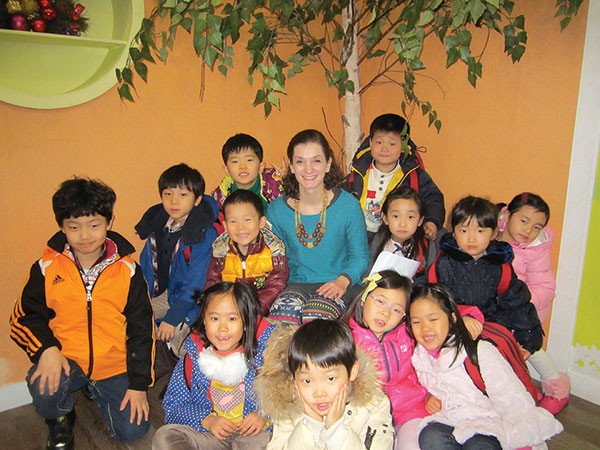Like many young college graduates during the Great Recession, Stephanie Giegel was having a hard time finding a job. Fed up with working too many hours for too little pay, she decided to change careers and take a position across the globe.
"I had been working in the fashion industry in New York City for around six years, for several companies, all of which turned out to be a bad place to work for one reason or another," Giegel wrote in an email interview.
Giegel, 28, originally from Observatory Hill, says she was growing more discouraged, depressed and impatient by the day.
"Jobs with a good salary and reasonable working hours became harder and harder to find," Giegel says. "After I was laid off for the second time in three years, I decided it was time for a change."
For Giegel, that change was drastic. She not only changed careers, she changed continents when she accepted a position to teach English to students in Daejeon, South Korea, last year.
Megan Rees, 26, from McKees Rocks, also moved to Daejeon as part of the English Program in Korea (EPIK) in 2011.
EPIK is run by the Korean Ministry of Education, Science and Technology. According to the program's website, EPIK looks for applicants who are native English speakers from Australia, Canada, Ireland, New Zealand, the United Kingdom and the United States.
Applicants do not have to have any teaching experience, but they must have earned a bachelor's degree in some field from an accredited university.
Monthly salaries vary by Korean province and the metropolitan area teachers are placed in. EPIK's site shows the minimum salary is about $1,700 per month. Salaries rise for applicants with teaching experience and for those with advanced degrees.
"The benefits of coming here are great. You make a good salary and have good vacation time. EPIK also pays for your plane ticket, gives you starting money and a furnished apartment that is rent-free," Rees wrote in an email interview. "Americans living in Korea pay no taxes for two years and get the pension deductions from their paycheck back when they leave Korea."
Giegel and Rees did not speak any Korean when they accepted the positions.
"The language barrier was a big shock to me. I did not realize how much of a privilege it is to be able to speak freely," Rees says. "I have to slow down my speech and be mindful of what I say, avoiding slang and idioms."
Giegel says she got by "mostly with a lot of grunting and pointing. Sometimes if I need something specific from a store I try to bring a picture of it."
Neither Giegel nor Rees had any teaching experience beforehand, something that made them nervous after accepting the job and landing in South Korea
"My first time teaching was a little scary and it feels like a blur. I remember one of the exercises I had planned failed miserably," Rees says. "I have grown so much as a teacher since the first day."
Giegel says teaching various age groups at her school presents interesting challenges.
"The younger elementary-school kids with a very low level of English are particularly difficult to teach," Giegel says. Middle-school students have a better grasp of the language, she says and are well-informed about American pop culture and global affairs.
Giegel teaches at Kids Apple English Immersion School, which is a private academy. Rees teaches at Daejeon Girls' Commercial High School, a public school.
Both Giegel and Rees say they sometimes get homesick, but keep in contact with family in Pittsburgh via emails, Skype and Facebook.
Stephanie's father, Steve Giegel of Butler, says he is pleased that his daughter took the job in Korea.
"I think it is a great opportunity. She was growing weary in New York. When she told me about it, I thought it would be a good experience for her," he says.
Nancy Rees, of Mckees Rocks, says she is proud of her daughter and not surprised that she ended up finding this calling half way across the globe.
"Nothing that Megan does surprises me," Nancy Rees says. "She has always wanted to live in other countries and when she wants to do something, she finds a way."
EPIK teachers sign a one-year contract and have the option to renew. Giegel is considering signing on for another year. After two years in South Korea, Rees says she has decided to take a job to teach English in Japan beginning in May.
"My dream in life is to travel the world and experience living in different cultures," says Rees. "It gives you the [confidence to start] a new life from scratch, and it teaches you the world is bigger than what you have known growing up."















